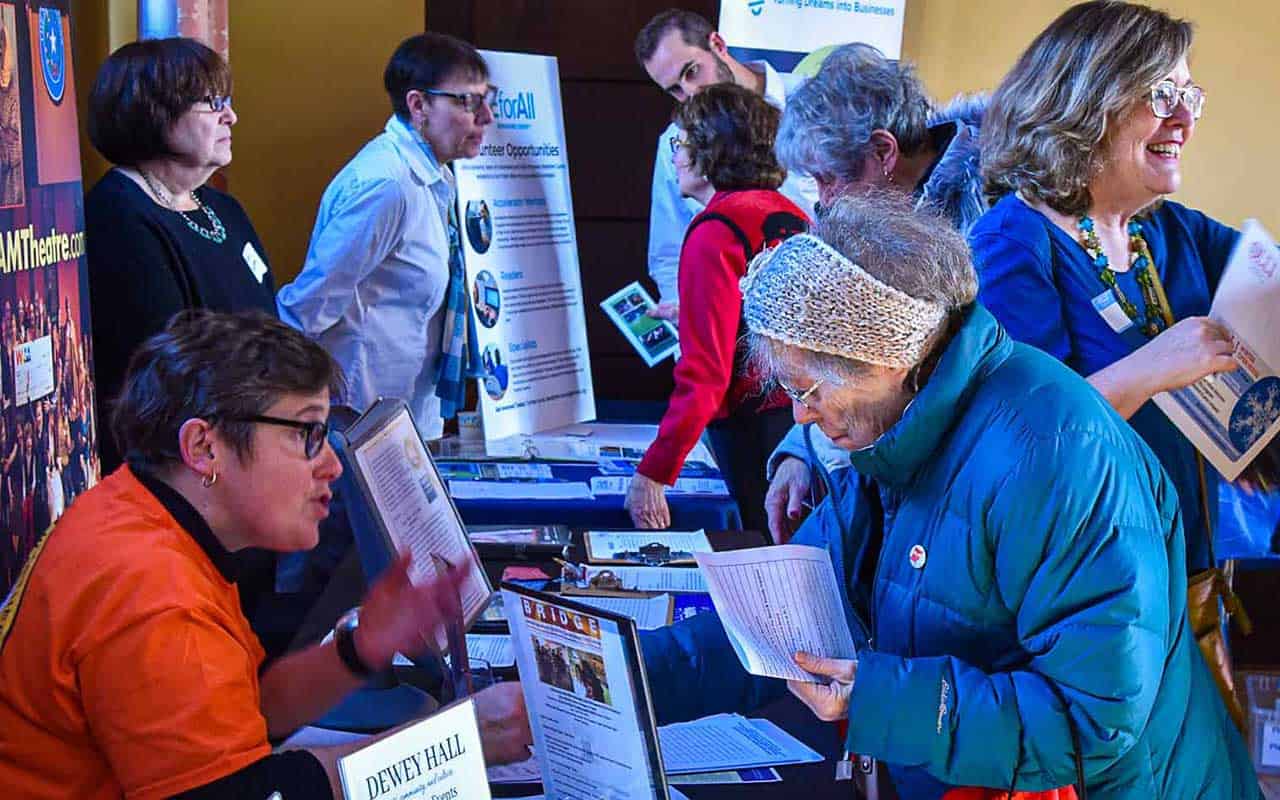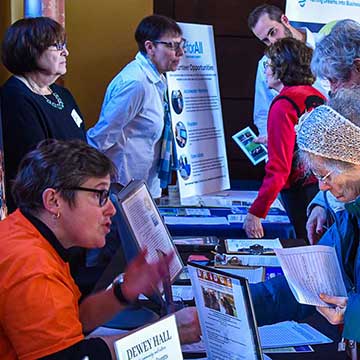This Month’s Featured Article

Volunteering – Why Doing Good Is Good for You
 Volunteerism is the engine that makes many of our communities run. Look around your town, and you’ll see what I mean. From houses of worship, fire and ambulance services, food pantries and soup kitchens, libraries, environment and conservation efforts, and social service agencies, lives are enhanced and needs are met through the work of volunteers and the non-profits they serve.
Volunteerism is the engine that makes many of our communities run. Look around your town, and you’ll see what I mean. From houses of worship, fire and ambulance services, food pantries and soup kitchens, libraries, environment and conservation efforts, and social service agencies, lives are enhanced and needs are met through the work of volunteers and the non-profits they serve.
Aside from the good that volunteering does for the recipients in our communities, the act of service carries benefits for the doer. While ethics may promote the moral worth of intrinsically acting out of duty and altruism without regard to external benefits, I think taking a more consequentialist approach to the good we do by volunteering is valid, we can be less concerned about the purity of the intention – the why – and focus on its positive benefits for the volunteers themselves as a motivator to action.
Forget the apple a day – volunteer instead
Volunteering is good for your health and wellbeing. Studies consistently show that serving others provides real mental health benefits, increases happiness, and decreases depression and anxiety. Since there is also a growing body of evidence linking mental health to physical health, volunteering is beneficial for both mind and body. Volunteering is connected to decreased stress and blood pressure in older adults, leading to a longer lifespan.
Volunteering increases a connection to a cause larger than ourselves – a basic human craving. Isolation, loneliness, and alienation are bad for us. Social interaction, camaraderie, empathy building, and bonding with like-minded people with shared values – all of which volunteering provide – are good for us.
Service to others confers the “happiness effect.” In 2020, The Journal of Happiness Studies published a UK research paper about volunteering and happiness. It explored the chicken and egg question of whether volunteers are happier because they volunteer or if happier people tend to volunteer. The study found that even participants who cited lower wellbeing before volunteering reported increased happiness due to giving time to causes important to them.
This happiness effect has real economic value. The study also quantified levels of wellbeing reported as a result of volunteering and found that this level was the same as the satisfaction derived from an extra $1,100 per year in the pocket of someone with an average middle-class salary.
Volunteers also enhance the health of their communities. They fill gaps and create a more smoothly-functioning society. Grassroots identification and fulfillment of needs means that communities find ways to go beyond what local government and social service agencies can provide.
Creating value for your career
Suppose you want to gain resume-worthy experience, develop leadership skills, expand your professional network, or get a low-risk glimpse into a particular occupation. In that case, volunteering is a perfect solution.
Non-profits are looking for skills and dependable people who have or want to develop them. Direct service delivery, social media strategy and posting, website design, financial and legal services, administrative help, event planning, and fund and friend-raising are just some of the ways you can contribute your time.
Another important volunteer function is board membership. According to Liana Toscanini, executive director of the Non-Profit Center of the Berkshires (NPC), it’s a myth that non-profit boards are only looking for members with deep pockets.
A well-rounded board takes all kinds of skills. “Board membership is a key volunteer position. While board members may be expected to donate funds, they’re only asked to do so in a meaningful amount – to them. What’s more important is a willingness to roll up their sleeves and help and to assist in making connections in the community.” And those connections include the trades, as well as lawyers and accountants. Everyone needs a plumber – including non-profits!
Toscanini comments that sometimes volunteers don’t truly understand how their skills and desire to help can translate into real value for themselves and a non-profit. “Skills-based volunteering is on the rise, particularly among Millennials. That’s why NPC assembled a resource listing all of the possible skill sets valuable to a non-profit.” These skills range from technical skills such as Microsoft Excel to soft skills such as patience and creativity.
Volunteering is also an excellent way to transition to employment. Toscanini reflects on her journey to employee from volunteer at Great Barrington-based Community Access to the Arts. “It happens a lot; someone who proves themself as an effective volunteer, along with showing a devotion to the non-profit’s cause, can become a valued employee.”
Finding the perfect match
For volunteering to provide maximum benefit to both you and the non-profit, there’s some research and courting that needs to happen. If the fit isn’t right, you’re likely not to feel as good about your time with an organization, which will be less valuable to you and them.
To help volunteers find opportunities, Toscanini is happy to serve as the volunteer yenta of the Berkshires through NPC’s work and its annual Giving Back Guide. “We wanted to make it easier for volunteers and non-profits to find each other. The Guide is an exhaustive list of Berkshire-based non-profits, with organizational profiles and specific ways people can help.”
The Salisbury Association in Salisbury, CT, recently published its Resource Guide for Volunteering in Our Local Communities with the goal of highlighting local non-profits and opportunities for volunteers.
Websites such as www.volunteermatch.org and www.greatnonprofits.org connects volunteers with organizations and causes that need them.
NPC also hosts a yearly volunteer fair that promotes a speed-dating approach to matching volunteers and organizations. COVID brought that successful event online. This past November, 165 attendees and 37 Berkshire-based non-profits explored connections and ways to provide mutual benefit.
Qualities of a great volunteer
Just saying you want to help is not enough. Even though you’re donating your time, a good volunteer makes every hour count. Effective volunteers bring energy and enthusiasm, creativity, flexibility, commitment, reliability, collaboration, and a willingness to give of themselves to a cause. It also requires an all-hands-on-deck approach of pitching in where the help is needed, whether it’s setting up tables or phone banking during the fundraising season.
Sometimes non-profits are neck-deep in fulfilling their mission and might not have the time to think spaciously about ways to enhance their work. Think about the organization’s operations and suggest ways you can add value. Is it creating bilingual resources? Proposing a new brochure aimed at a specific organizational demographic? Writing for their newsletter from an alternate perspective? Managing a new type of fundraising event?
Consider the time you have to give to the organization. Can you manage a multi-year board membership, or would episodic volunteering suit you better? Maybe you only have the bandwidth to set up an event or stuff envelopes. Never assume that giving a small amount of time would not be valued.
Building volunteer capacity at non-profits
NPC’s mission includes providing a clearinghouse of resources to help non-profits serve their missions more sustainably and effectively. To that end, Toscanini hosts workshops and develops resources to help non-profits attract, train, and retain volunteers.
Part of an effective non-profit’s strategy must include volunteer management. Taking care of volunteers takes time and skill. It’s essential to make them feel respected and valued for the work they do. That means providing them with proper training and instituting a gratitude process to consistently show volunteers how important their time and effort are to the non-profit’s work. Gratitude is a powerful motivator, and it increases the satisfaction volunteers derive from their work, which keeps them coming back and potentially matching their donated time with donated treasure.
Non-profits might also want to consider attracting volunteers in ways that go beyond the cause itself. Instead of appealing to people’s passion for an organizational mission and their sense of altruism, appeal to the other reasons why people volunteer described in this article. Tell them how much fun they’d have socializing and bonding with other volunteers. Provide them with evidence that serving others improves their health. Inform them of the increased happiness, and wellbeing volunteering would bring them – that warm glowy feeling is a compelling motivator. Show them the skills and professional network they’d cultivate by being involved with your organization that can translate into career success.
Step up in baby steps
The first step in volunteering is to think about your values and priorities and see how they overlap with the needs in your community, as well as the non-profits working in those spaces. From there, assess the skills and capacities you possess or want to build and what you’d like to achieve or obtain out of your volunteer experience, whether is that warm feeling or a specific career objective. Be realistic with the time you commit. It’s much easier to start small and build than to overcommit and under-deliver. Then do some research. Look at websites and social media accounts of specific non-profits, go to an event they sponsor, and talk to staff, board members, and other volunteers. All of these measures will make you an informed volunteer who’s ready to pitch in and contribute in ways that make sense for you and the organization.
The Non-Profit Center of the Berkshires (NPC) facilitates growth for charitable organizations through shared resources, affordable services, and creative collaborations. For more information about their services and to find their Giving Back Guide and resources for volunteers, visit www.npcberkshires.org.
You can access the Resource Guide for Volunteering in Our Local Communities on the Salisbury Association’s website, www.salisburyassociation.org, and the Town of Salisbury’s website, www.salisburyct.us.



